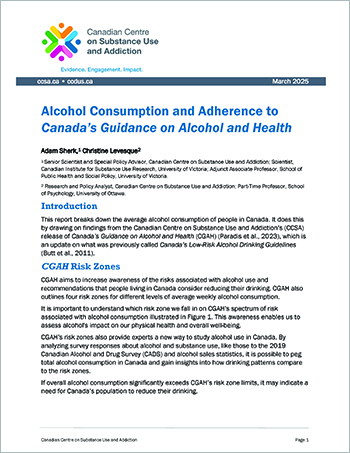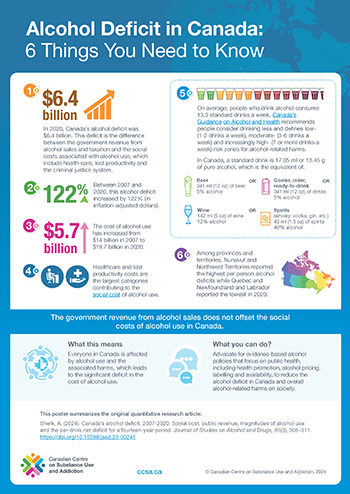Most Recent Publications on Alcohol
Know Your Standard Drink — Summary Poster
Helps you understand what a standard drink is and how consuming smaller drinks or ones with lower alcohol content can reduce your health risks. Uses clears images to show...

Alcohol Consumption and Adherence to Canada’s Guidance on Alcohol and Health
Examines the average alcohol consumption of people in Canada and where it falls within the risk...

Alcohol Deficit in Canada: 6 Things You Need to Know
Defines the alcohol deficit as the difference between what the government earns in tax revenue from the sale of alcohol and how much it spends on harms related to alcohol....
What Is Alcohol?
Alcohol, also known as ethanol, is a legal substance known for its psychoactive properties. It is produced by fermenting or distilling produce or grains. Fermented beverages include beer, cider, wine and flavoured purified alcohol, which range from 0.5% to 20% alcohol by volume (ABV). Distilled beverages, often called spirits, include products such as vodka and whisky, which usually are 25% ABV and higher.
Many social gatherings feature alcoholic beverages. Nevertheless, the consumption of alcohol carries a risk of adverse health and social consequences related to its intoxicating, toxic and dependence-producing properties. To avoid harms, people in Canada who choose to drink should follow Canada’s Guidance on Alcohol and Health (on Drink Less Live More.ca) which replaced Canada’s Low-Risk Alcohol Drinking Guidelines.
Heading
Canada's Guidance on Alcohol and Health
CCSA proudly led the initiative to update Canada’s Low-Risk Alcohol Drinking Guidelines (LRDGs). The project, funded by Health Canada, began in July 2020.
The two-and-a-half-year process culminated in the creation of Canada’s Guidance on Alcohol and Health, which replaces the LRDGs. Canada’s Guidance on Alcohol and Health provides people living in Canada with the information they need to make well-informed and responsible decisions about their alcohol consumption

Highlights
Heading
Communications Toolkit
This toolkit contains CCSA resources related to Canada’s Guidance on Alcohol and Health that are available to your organization at no cost. We invite you to use the resources to help promote Canada’s Guidance on Alcohol and Health and amplify the key messages.
Heading
Frequently Asked Questions
Find clear, concise responses to the most asked questions. We've gathered the most common inquiries and provided straightforward answers to help you navigate with confidence.
Heading
Supporting Documents
This section brings together the foundational materials that informed the development of Canada’s Guidance on Alcohol and Health. From technical reports and expert reviews to public-facing summaries and infographics, these documents provide the evidence base, context, and rationale behind the recommendations.
.

Heading
Establishing Rapport to Discuss Alcohol Use
The clinician takes a non-judgmental and motivational stance, setting the stage for asking a patient to identify specific problems related to alcohol use.

Heading
Exploring Reasons for Drinking; Building Ambivalence
The clinician asks the patient to identify benefits associated with alcohol use. The clinician then contrasts these felt benefits with the problems noted earlier in order to increase the patient's ambivalence.
Get to know our team of experts
Bryce Barker, PhD, CE
Senior Knowledge Broker
Area of Expertise:
Doug Beirness, MSc, PhD
Senior Research Associate
Area of Expertise:
Alexander Caudarella, MDCM CCFP AM ABAM(d)
CEO
Area of Expertise:
Kim Corace, PhD, C.Psych.
Vice President, Innovation and Senior Scientist
Area of Expertise:
Karen Cumberland, MPA
Vice President, Strategic Initiatives and Community Outreach
Area of Expertise:
Timothy Deloughery, CCAC, CCS-AC
Substance Use Health Specialist
Area of Expertise:
Robert Gabrys, PhD
Senior Research and Policy Analyst
Area of Expertise:
Heading
Guidance, Tools and Resources
CCSA produces research-based publications, tools, and resources to support evidence-based decision-making on substance use health issues. Select your area of interest from the six categories below:
Heading
Substances
Delve into key resources on commonly used substances, such as alcohol, cannabis, opioids, stimulants and psychedelics. Learn about their effects, usage patterns, associated health and social consequences, and harm reduction considerations
Heading
Personal and Societal Impacts
Get insights on the personal and societal impacts of substance use and addiction , including gambling and impaired driving, and their effects on health, safety, and social well-being. Learn about effective prevention and harm-reduction strategies in various sectors.
Heading
Communities
Communities share common interests, values or goals, and interact with one another to build relationships and help networks. These materials support more inclusive, equitable, and community-informed responses to substance use and addiction. Dive into resources highlighting people with lived and living experience, stigma, sex- and gender-based analysis, Indigenous Peoples, and housing.
Heading
Treatment and Prevention
Explore medical, psychological, and social approaches aimed at helping individuals avoid or recover from substance use disorders. Get the facts on public health topics and learn about collaborative efforts to reduce stigma and promote more equitable, inclusive responses to substance use.
Heading
Youth
Learn about factors influencing substance use in young people, including childhood trauma and brain development, and get tools to support adult allies in leading meaningful, evidence-informed conversations with youth. Content promotes early prevention, harm reduction and supportive environments for youth up to age 25.
Heading
Substance Use and the Workplace
Substance use has a significant impact on the workplace, potentially affecting safety, productivity and employee well-being. Explore research on substance use in various industries. Resources support workplace leaders in building more supportive, stigma-free environments through practical strategies, improved approaches and initiative-taking education.